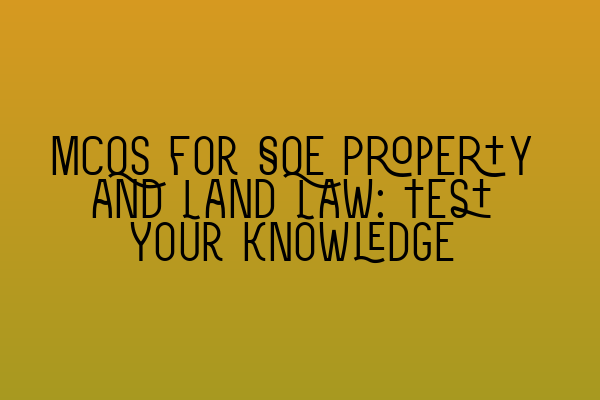MCQs for SQE Property and Land Law: Test Your Knowledge
Welcome to SQE Property Law & Land Law, where we are committed to providing you with the best resources to help you succeed in your legal studies. In this blog post, we have put together a series of multiple-choice questions (MCQs) to test your knowledge of property and land law for the Solicitors Qualifying Examination (SQE).
Before we dive into the MCQs, let’s quickly go over the importance of practicing with MCQs when preparing for the SQE exams. MCQs are an effective study tool because they test your understanding of key concepts, help you identify areas where you need improvement, and improve your overall exam-taking skills.
Ready to test your knowledge? Let’s get started with the MCQs:
- Which of the following is NOT a type of property recognized in English law?
- a) Real property
- b) Personal property
- c) Intellectual property
- d) Virtual property
- What is the maximum duration of a leasehold estate in England and Wales?
- a) 99 years
- b) 125 years
- c) 150 years
- d) 999 years
- Which of the following is a characteristic of a legal mortgage?
- a) The borrower retains legal title
- b) The lender has the right to possession
- c) The mortgage is not registered
- d) The mortgagee is not required to obtain insurance
- What is the first step in the process of transferring registered land?
- a) Completion of the transfer deed
- b) Submission of an application to the Land Registry
- c) Obtaining consent from the seller
- d) Payment of stamp duty
- Which of the following statements about adverse possession is TRUE?
- a) Adverse possession cannot be claimed on registered land
- b) Adverse possession requires continuous occupation for 15 years
- c) Adverse possession extinguishes the legal owner’s title
- d) Adverse possession applies only to residential properties
- What is the primary purpose of a restrictive covenant?
- a) To restrict the use of the land
- b) To enhance the value of the land
- c) To prevent the land from being sold
- d) To allow the landowner to enter the property
- Which of the following is a form of security commonly used in property transactions?
- a) Debenture
- b) Charge
- c) Guarantee
- d) Option
- What is the legal principle of “caveat emptor”?
- a) Let the buyer beware
- b) Let the seller beware
- c) Let the landlord beware
- d) Let the tenant beware
- Which of the following is a key requirement for adverse possession?
- a) Exclusive possession
- b) Written consent from the owner
- c) Payment of rent to the owner
- d) Continuous occupation for 1 year
- What is the main regulatory body responsible for land registry in England and Wales?
- a) HM Land Registry
- b) Law Society
- c) Land Registry Council
- d) Solicitors Regulation Authority
How did you do? Remember, the purpose of this MCQ quiz is not only to test your knowledge but also to help you identify areas where you may need to focus your study efforts. If you struggled with any of the questions, don’t worry. This is a learning process, and practicing with MCQs is an excellent way to improve your understanding of property and land law.
If you’re looking for more practice questions and resources to help you prepare for the SQE exams, we recommend checking out our related articles:
- SQE 1 Practice Exam Questions
- SQE 1 Practice Mocks FLK1 FLK2
- SQE 2 Preparation Courses
- SQE 1 Preparation Courses
- SRA SQE Exam Dates
By regularly practicing with MCQs and utilizing our comprehensive preparation courses, you can enhance your knowledge and increase your chances of success in the SQE exams. Good luck with your studies!
Disclaimer: This blog post is for informational purposes only and should not be construed as legal advice. Always consult with a qualified solicitor or legal professional for specific guidance on property and land law matters.
